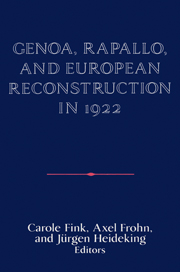Book contents
- Frontmatter
- Introduction
- 1 Beyond Revisionism: The Genoa Conference of 1922
- 2 The Genoa Conference of 1922: Lloyd George and the Politics of Recognition
- 3 A Rainy Day, April 16, 1922: The Rapallo Treaty and the Cloudy Perspective for German Foreign Policy
- 4 Reparations in 1922
- 5 Germany and the United States: The Concept of World Economic Interdependence
- 6 American Policy Toward Debts and Reconstruction at Genoa, 1922
- 7 French Plans for the Reconstruction of Russia: A History and Evaluation
- 8 The Oil Problem and Soviet-American Relations at the Genoa Conference of 1922
- 9 Italy at the Genoa Conference: Italian-Soviet Commercial Relations
- 10 The European Policy of Czechoslovakia on the Eve of the Genoa Conference of 1922
- 11 The Genoa Conference and the Little Entente
- 12 The Role of Switzerland and the Neutral States at the Genoa Conference
- 13 The Genoa Conference and Japan: A Lesson in Great-Power Diplomacy
- Maps
- Appendix
- Bibliography
- Contributors
- Index
Introduction
Published online by Cambridge University Press: 05 January 2013
- Frontmatter
- Introduction
- 1 Beyond Revisionism: The Genoa Conference of 1922
- 2 The Genoa Conference of 1922: Lloyd George and the Politics of Recognition
- 3 A Rainy Day, April 16, 1922: The Rapallo Treaty and the Cloudy Perspective for German Foreign Policy
- 4 Reparations in 1922
- 5 Germany and the United States: The Concept of World Economic Interdependence
- 6 American Policy Toward Debts and Reconstruction at Genoa, 1922
- 7 French Plans for the Reconstruction of Russia: A History and Evaluation
- 8 The Oil Problem and Soviet-American Relations at the Genoa Conference of 1922
- 9 Italy at the Genoa Conference: Italian-Soviet Commercial Relations
- 10 The European Policy of Czechoslovakia on the Eve of the Genoa Conference of 1922
- 11 The Genoa Conference and the Little Entente
- 12 The Role of Switzerland and the Neutral States at the Genoa Conference
- 13 The Genoa Conference and Japan: A Lesson in Great-Power Diplomacy
- Maps
- Appendix
- Bibliography
- Contributors
- Index
Summary
Over a half century ago, in January 1929, the French historians Marc Bloch and Lucien Febvre issued a moving appeal for international collaborative inquiry. These two World War I veterans, coeditors of a new scholarly journal, the Annales, were committed to comparative history: to a history that transcended conventional national, disciplinary, and chronological barriers and treated historical subjects with as large a view as possible. Although they did not lack esteem for the work of the solitary scholar, Bloch and Febvre considered cooperative inquiry to be an indispensable reinforcement to gathering documentation, testing theories, and formulating useful hypotheses.
This volume of original essays by recognized scholars of the history of international relations represents a modest effort to meet this challenge: to tap the rich but dispersed archival resources of over a dozen states and a considerable amount of scholarly literature. Drawing on a variety of experiences and perspectives in an effort to comprehend the problem of European reconstruction after World War I, the contributors have demonstrated a dedicated commitment to collective, comparative research.
From April 10 to May 19, 1922, delegates from thirty-four nations met in the north Italian city of Genoa to deliberate on the economic reconstruction and political stabilization of Europe. This conference, a key event of European diplomacy in the interwar period, provides an ideal research subject for a multinational study. In the wake of the Great War, the Russian Revolution, and the Paris Peace Treaties, the Genoa Conference brought together ideological enemies as well as victors, vanquished, and neutrals.
- Type
- Chapter
- Information
- Genoa, Rapallo, and European Reconstruction in 1922 , pp. 1 - 10Publisher: Cambridge University PressPrint publication year: 1991

